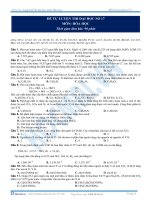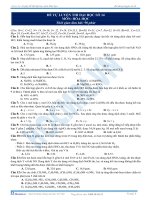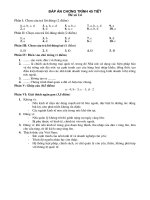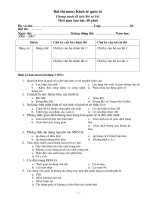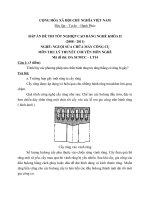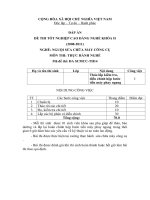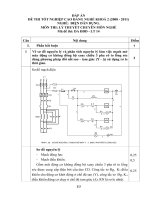PASSAGE 14
Bạn đang xem bản rút gọn của tài liệu. Xem và tải ngay bản đầy đủ của tài liệu tại đây (37.47 KB, 2 trang )
PASSAGE 14
Most languages have several levels of vocabulary that may be used by the same speakers. In English,
at least three have been identified and described.
Standard usage includes those words and expressions understood, used, and accepted by a majority of
the speakers of a language in any situation regardless of the level of formality. As such, these words and
expressions are well defined and listed in standard dictionaries. Colloquialisms, on the other hand, are
familiar words and idioms that are understood by almost all speakers of a language and used in informal
speech or writing, but not considered acceptable for more formal situations. Almost all idiomatic
expressions are colloquial language. Slang, refers to words and expressions understood by a large number
of speakers but not accepted as appropriate formal usage by the majority. Colloquial expressions and
even slang may be found in standard dictionaries but will be so identified. Both colloquial usage and
slang are more common in speech than writing.
Colloquial speech often passes into standard speech. Some slang also passes into standard speech, but
other slang expressions enjoy momentary popularity followed by obscurity. In some cases, the majority
never accepts certain slang phrases but nevertheless retains them in their collective memories. Every
generation seems to require its own set of words to describe familiar objects and events.
It has been pointed out by a number of linguists that three cultural conditions are necessary for the
creation of a large body of slang expressions. First, the introduction and acceptance of new objects and
situations in the society; second, a diverse population with a large number of subgroups; third, association
among the subgroups and the majority population.
Finally, it is worth noting that the terms "standard", "colloquial", and "slang" exist only as abstract
labels for scholars who study language. Only a tiny number of the speakers of any language will be aware
that they are using colloquial or slang expressions. Most speakers of English will, during appropriate
situations, select and use three types of expressions.
Question 1. Which of the following is the main topic of the passage?
A. Standard speech
B. Idiomatic phrases
C. Dictionary usage
D. Different types of vocabulary
Question 2. The word “appropriate” in paragraph 2 is closest in meaning to _____.
A. old
B. correct
C. important
D. large
Question 3. The word “obscurity” in paragraph 3 could be best replaced by _____.
A. qualification
B. disappearance
C. influence
D. tolerance
Question 4. The word “them” in paragraph 3 refers to _____.
A. slang phrases
B. words
C. the majority
D. memories
Question 5. Where in the passage does the author explain where colloquial language and slang are most
commonly used?
A. The last sentences of paragraph 2
B. The last sentences of paragraph 3
C. The first two sentences of paragraph 2
D. The last two sentences of paragraph 5
Question 6. The author mentions all of the following as requirements for slang expressions to be created
EXCEPT _____.
A. a number of linguists
B. a new generation
C. interaction among diverse groups
D. new situations
Page 1
Question 7. It can be inferred from the passage that the author_____.
A. does not approve of colloquial usage in writing
B. approves of slang and colloquial speech in appropriate situations
C. does not approve of either slang or colloquial speech in any situation
D. approves of colloquial speech in some situations, but not slang
ĐÁP ÁN
1-D
2-B
6-A
7-B
3-B
4-A
5-A
LỜI GIẢI CHI TIẾT
Question 1:
Chủ đề của đoạn văn là:”different types of vocabulary” = các loại từ vựng khác nhau. Ta chọn chủ đề này
vì đoạn văn tập trung chủ yếu vào ba loại từ vựng: Standard, Colloquial và Slang.
Các phương án khác:”standard speech” là văn nói chuẩn; “idiomatic phrases” là các thành ngữ,
“dictionary usage” là cách sử dụng từ điển.
Question 2:
appropriate = phù hợp, correct = đúng đắn
Question 3:
obscurity = disappearance (sự biến mất), trong đoạn văn nói “but other slang expressions enjoy
momentary popularity followed by obscurity”.
Các từ khác:”qualification” = phẩm chất; năng lực cần thiết cho một nghề, việc; “influence”= ảnh hưởng;
“tolerance” = sự chịu đựng
Question 4:
đại từ “them” đề cập đến “slang phrases” – đọc và tìm các danh từ trước từ “them” thì ta thấy nó nói tới
“slang phrases”: các cụm tiếng lóng
Question 5:
tác giả giải thích nơi mà ngơn ngữ thơng tục và tiếng lóng được sử dụng rộng rãi nhất trong các câu cuối
đoạn 2.
Question 6:
tác giả đề cập đến những yêu cầu để tạo ra các cụm từ tiếng lóng ngoại trừ: 1 số nhà ngôn ngữ học. các
phương án khác đều dẫn đến việc hình thành tiếng lóng “a new generation” = một thế hệ mới; “interaction
among diverse groups” = ảnh hưởng qua lại giữa các nhóm đa dạng; “new situations” = tình huống mới.
Question 7:
ta có thể suy từ đoạn văn rằng tác giả ủng hộ việc sử dụng tiếng lóng và lời nói thơng tục trong những
tình huống thích hợp.
Page 2

